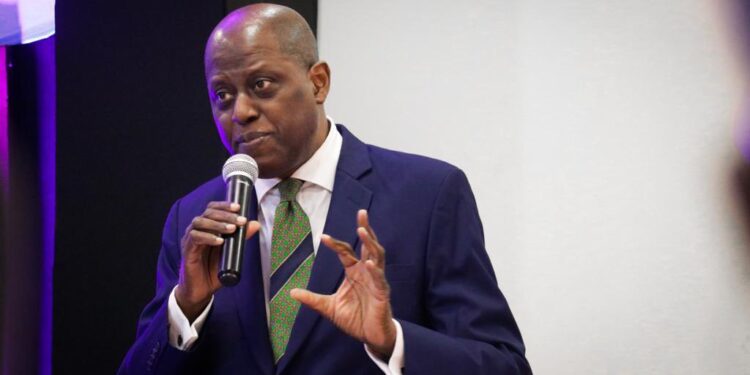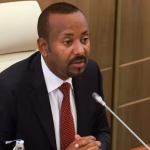Benchmark rates in the country require some patience from industry players as the CBN is working to slow down the increases witnessed overtime. This is according to the CBN Governor, Dr. Olayemi Cardoso who spoke at the official launch of a book authored by Ray Echebiri and titled ‘The Power of One Man: How the Soludo-Engineered Consolidation Transformed Nigerian Banks to Global Players’ yesterday in Lagos State.
Governor Cardoso, represented by the CBN’s Deputy Governor of Financial Stability, Phillip Ikeazor, emphasized the shared benefits of maintaining high rates in an economy, one of which he said was the avoidance of the risk of hyperinflation which comes with its own numerous and far-reaching demerits.
According to the CBN Governor, the point of hyperinflation is not one that any nation should get into because its’ accompanying consequences on the nation’s economy can hardly be evaded.
Cardoso, while citing examples of some countries that have unfortunately reached hyperinflation, though without mentioning names, said the affected countries which include one with significant oil reserves in South America and another in East Africa have been battling the menace in a long time and may not be able to get off it anytime soon.
He said, if Nigeria gets into hyperinflation, it can cause the transmission of monetary economic tools to become completely ineffective, adding that the central bank is playing its part to evade the economic crisis by focusing on its core mandate of price stability, maintaining a stable exchange rate and economic growth even though the question of sequencing still lingers.
Cardoso also spoke on how long the rate hikes will be maintained stating that it will last for as long as the CBN can control and reverse galloping inflation.
According to him, once that is done, hikes can thereafter be maintained just like the Western world had previously done by maintaining rate hikes to be able to control theirs.
“They maintained it for a very long time. It is only now that they have stopped rate hikes, but they have not even started dropping the rates as we speak,” he said, adding that, “it is important that we tighten and hold on for a little while and in no distant future, we will be able to slow down on the rate hikes.”
The CBN Governor also said further capitalisation of banks in the country was necessary for the common good of the nation.
According to him, the move, which was also taken by former CBN Governor, Chukwuma Soludo 18 years ago, was aimed at making the banks robust, resilient and fit for purpose to grow the economy.
The event was attended by eminent Nigerians, including former President Olusegun Obasanjo; former Governor of the Central Bank of Nigeria, Prof. Chukwuma Soludo and Governor Babajide Sanwo-Olu of Lagos state, among others.
In his speech, former President Olusegun Obasanjo, represented by former Cross River State governor, Donald Duke, believed that working with the right team was paramount in every economy.
According to him, working with best team was the best thing that could happen to any leader as this would greatly impact the possibilities of them winning or doing otherwise.
He said, “I believe that I am that one man because I put together the team. It’s like a coach, a football manager, you pick the captain, and the captain was Captain Soludo.
“But, without the team, they are not going to win a match. So, Captain Soludo has saluted his team, but I take pride in having put together the team.”
The former President Olusegun Obasanjo also advocated for appropriate fiscal and monetary policy synergy that would help revolutionise the banking industry and achieve economic stability.
“To sustain this growth, there must be appropriate consultations between fiscal and monetary authorities,” he said, while applauding the courage of Anambra State governor and former CBN governor, Professor Chukwuma Soludo, in executing the 2005 banking sector consolidation, saying, “The consolidation initiated by Soludo was a courageous and necessary move. It has significantly contributed to the stability and growth of our banking sector.”
Earlier in his speech, Sanwo-Olu, said the book came at a time to reflect as economists, bankers, opinion leaders, businessmen and politicians and look at how Soludo’s team survived those challenges.
He urged the CBN to take decisive actions to stabilise the economy, particularly in managing interest rates and inflation, to alleviate the pressures faced by the private sector.
He said, ‘’We’re also at a point where the current CBN and the leadership are going through a similar exercise, banking consolidation, increment in share capital and the rest of it.
“The private sector is currently experiencing tough times due to various economic challenges. The CBN must take swift and effective measures to stabilise the economy. Learning from the past reforms can guide us through these turbulent times.”
In his remarks, the Executive Governor of Anambra state and former Governor of the Central Bank of Nigeria, Chukwuma Soludo recounted the challenges faced during the 2005 consolidation but expressed pride in the achievement and urged the current CBN leadership to remain resolute in their efforts to recapitalise the banks to keep pace with the expanding economy.
Meanwhile, recall that the current CBN Governor had had in May, reportedly stated that the apex bank would sustain interest rate hikes until inflation was tamed.
Financial Times also reported that, Cardoso noted that there was “every indication” that MPC would “do whatever is necessary” to rein in inflation.
“They will continue to do what has to be done to ensure that inflation comes down. Let’s face it: for a long period of time, the CBN did not embrace orthodox monetary policies. We want to go back to using an orthodox method, and it will take us to where we want to go,” he remarked.
Nigeria’s headline inflation rate increased to 33.95 per cent relative to 33.69 per cent in April, according to data from the National Bureau of Statistics published in May 2024- the same month in which the Monetary Policy Committee of the CBN increased the benchmark lending rate by 150 basis points to 26.25 per cent from 24.75 per cent.




